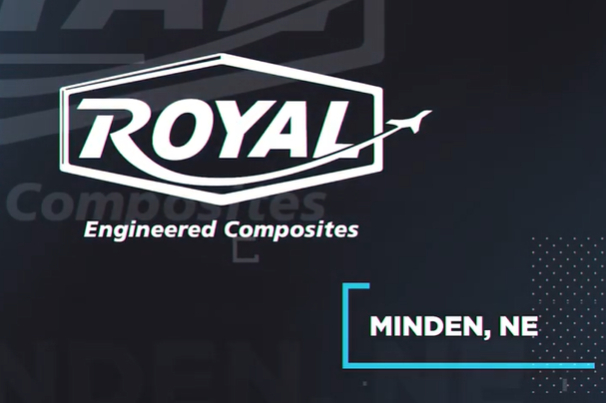Royal Engineered Composites named Innovation Business of the Year
The NBDC-based award was given based on the company’s goal to develop more efficient manufacturing processes, reduce scrap, labor and improve supply chain via robotic and AI technologies.

Photo Credit: Royal Engineered Composites
It was announced on March 23 that Royal Engineered Composites (Minden, Neb., U.S.) has been recognized by the Nebraska Business Development Center (NBDC, Omaha) as the 2020 Innovation Business of the Year. This award is given to an NBDC client who advances technological innovation, partners with a Nebraska university to meet federal research and development needs or increases commercialization of federal research.
Royal’s innovation involves combining robotic technologies with machine vision systems utilizing high-definition cameras, tuned light sources and artificial intelligence (AI) to develop more efficient manufacturing processes.
“We are marrying robotics with vision systems, so a system actually becomes smarter with each part built,” Strategic Initiatives Engineer, Tim O’Dey says. “We want to be able to differentiate a good part from a potential scrap part and fix it before it has to be discarded.”
Program goals include increasing capacity and reliability within the supply chain, increasing the quality and consistency of the parts produced and reducing costs through labor and scrap reduction. Ultimately, the company is developing technology that will ensure its future, enabling it and its employees to flourish in the community it has been a part of for so many years, O’Dey says.
“We are not taking jobs away through automation; we are removing the tedious, repetitive work that employees don’t enjoy doing,” O’Dey says. “We aren’t interested in replacing people. A lot of opportunities will be created for our employee owners to grow personally and professionally as they train into these new roles around automation.”
Related Content
-
Plyable releases AI-powered mold design tool
Plyable continues to rid composites engineers of workflow bottlenecks through an end-to-end automated system — from mold design to quotation to manufacturing fulfillment.
-
SAM XL demonstrates closed-loop digital methodologies via full-size aerocomposite parts development
PeneloPe Project’s modular, zero-defect manufacturing deliverables are being highlighted in an upcoming video that demonstrates the resulting aerospace pilot line’s feasibility.
-
TAVieDA project team cuts aircraft door production time using thermoplastic composites, welding
Fraunhofer groups, Trelleborg and Airbus develop modular, fully automated assembly system concept to replace metals and time-consuming assembly that shows potential for scalability.






